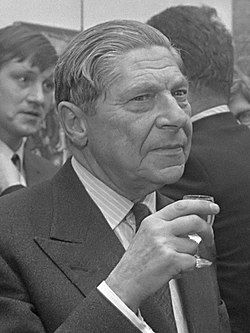Arthur Koestler Quote
On the historical scale, the damages wrought by individual violence for selfish motives are insignificant compared to the holocausts resulting from self-transcending devotion to collectively shared belief-systems. It is derived from primitive identification instead of mature social integration; it entails the partial surrender of personal responsibility and produces the quasi-hypnotic phenomena of group-psychology.
Arthur Koestler
On the historical scale, the damages wrought by individual violence for selfish motives are insignificant compared to the holocausts resulting from self-transcending devotion to collectively shared belief-systems. It is derived from primitive identification instead of mature social integration; it entails the partial surrender of personal responsibility and produces the quasi-hypnotic phenomena of group-psychology.
Related Quotes
About Arthur Koestler
Arthur Koestler (UK: , US: ; German: [ˈkœstlɐ]; Hungarian: Kösztler Artúr; 5 September 1905 – 1 March 1983) was an Austro-Hungarian-born author and journalist. Koestler was born in Budapest, and was educated in Austria, apart from his early school years. In 1931, Koestler joined the Communist Party of Germany but resigned in 1938 after becoming disillusioned with Stalinism.
Having moved to Britain in 1940, Koestler published his novel Darkness at Noon, an anti-totalitarian work that gained him international fame. Over the next 43 years, Koestler espoused many political causes and wrote novels, memoirs, biographies, and numerous essays. In 1949, Koestler began secretly working with a British Cold War anti-communist propaganda department known as the Information Research Department (IRD), which would republish and distribute many of his works, and also fund his activities. In 1968, he was awarded the Sonning Prize "for [his] outstanding contribution to European culture". In 1972, he was made a Commander of the Order of the British Empire (CBE).
In 1976, Koestler was diagnosed with Parkinson's disease and in 1979 with terminal leukaemia. On 1 March 1983, Koestler and his wife Cynthia died of suicide together at their London home by swallowing lethal quantities of barbiturate-based Tuinal capsules.
Having moved to Britain in 1940, Koestler published his novel Darkness at Noon, an anti-totalitarian work that gained him international fame. Over the next 43 years, Koestler espoused many political causes and wrote novels, memoirs, biographies, and numerous essays. In 1949, Koestler began secretly working with a British Cold War anti-communist propaganda department known as the Information Research Department (IRD), which would republish and distribute many of his works, and also fund his activities. In 1968, he was awarded the Sonning Prize "for [his] outstanding contribution to European culture". In 1972, he was made a Commander of the Order of the British Empire (CBE).
In 1976, Koestler was diagnosed with Parkinson's disease and in 1979 with terminal leukaemia. On 1 March 1983, Koestler and his wife Cynthia died of suicide together at their London home by swallowing lethal quantities of barbiturate-based Tuinal capsules.
